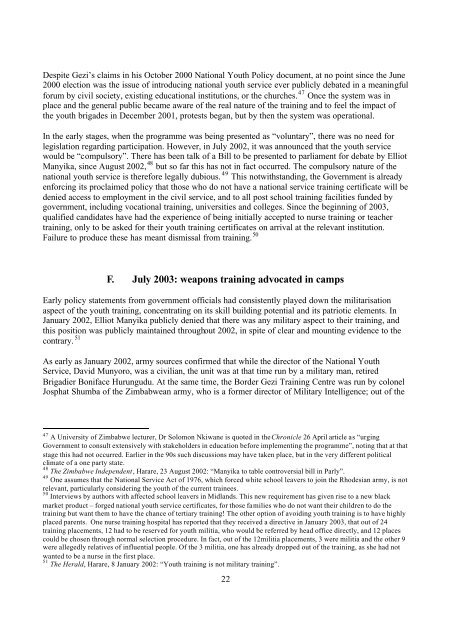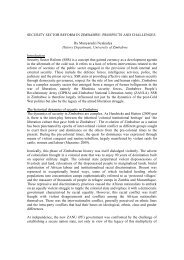National youth service training - Solidarity Peace Trust
National youth service training - Solidarity Peace Trust
National youth service training - Solidarity Peace Trust
You also want an ePaper? Increase the reach of your titles
YUMPU automatically turns print PDFs into web optimized ePapers that Google loves.
Despite Gezi’s claims in his October 2000 <strong>National</strong> Youth Policy document, at no point since the June<br />
2000 election was the issue of introducing national <strong>youth</strong> <strong>service</strong> ever publicly debated in a meaningful<br />
forum by civil society, existing educational institutions, or the churches. 47 Once the system was in<br />
place and the general public became aware of the real nature of the <strong>training</strong> and to feel the impact of<br />
the <strong>youth</strong> brigades in December 2001, protests began, but by then the system was operational.<br />
In the early stages, when the programme was being presented as “voluntary”, there was no need for<br />
legislation regarding participation. However, in July 2002, it was announced that the <strong>youth</strong> <strong>service</strong><br />
would be “compulsory”. There has been talk of a Bill to be presented to parliament for debate by Elliot<br />
Manyika, since August 2002, 48 but so far this has not in fact occurred. The compulsory nature of the<br />
national <strong>youth</strong> <strong>service</strong> is therefore legally dubious. 49 This notwithstanding, the Government is already<br />
enforcing its proclaimed policy that those who do not have a national <strong>service</strong> <strong>training</strong> certificate will be<br />
denied access to employment in the civil <strong>service</strong>, and to all post school <strong>training</strong> facilities funded by<br />
government, including vocational <strong>training</strong>, universities and colleges. Since the beginning of 2003,<br />
qualified candidates have had the experience of being initially accepted to nurse <strong>training</strong> or teacher<br />
<strong>training</strong>, only to be asked for their <strong>youth</strong> <strong>training</strong> certificates on arrival at the relevant institution.<br />
Failure to produce these has meant dismissal from <strong>training</strong>. 50<br />
F. July 2003: weapons <strong>training</strong> advocated in camps<br />
Early policy statements from government officials had consistently played down the militarisation<br />
aspect of the <strong>youth</strong> <strong>training</strong>, concentrating on its skill building potential and its patriotic elements. In<br />
January 2002, Elliot Manyika publicly denied that there was any military aspect to their <strong>training</strong>, and<br />
this position was publicly maintained throughout 2002, in spite of clear and mounting evidence to the<br />
contrary. 51<br />
As early as January 2002, army sources confirmed that while the director of the <strong>National</strong> Youth<br />
Service, David Munyoro, was a civilian, the unit was at that time run by a military man, retired<br />
Brigadier Boniface Hurungudu. At the same time, the Border Gezi Training Centre was run by colonel<br />
Josphat Shumba of the Zimbabwean army, who is a former director of Military Intelligence; out of the<br />
47<br />
A University of Zimbabwe lecturer, Dr Solomon Nkiwane is quoted in the Chronicle 26 April article as “urging<br />
Government to consult extensively with stakeholders in education before implementing the programme”, noting that at that<br />
stage this had not occurred. Earlier in the 90s such discussions may have taken place, but in the very different political<br />
climate of a one party state.<br />
48 The Zimbabwe Independent, Harare, 23 August 2002: “Manyika to table controversial bill in Parly”.<br />
49 One assumes that the <strong>National</strong> Service Act of 1976, which forced white school leavers to join the Rhodesian army, is not<br />
relevant, particularly considering the <strong>youth</strong> of the current trainees.<br />
50 Interviews by authors with affected school leavers in Midlands. This new requirement has given rise to a new black<br />
market product – forged national <strong>youth</strong> <strong>service</strong> certificates, for those families who do not want their children to do the<br />
<strong>training</strong> but want them to have the chance of tertiary <strong>training</strong>! The other option of avoiding <strong>youth</strong> <strong>training</strong> is to have highly<br />
placed parents. One nurse <strong>training</strong> hospital has reported that they received a directive in January 2003, that out of 24<br />
<strong>training</strong> placements, 12 had to be reserved for <strong>youth</strong> militia, who would be referred by head office directly, and 12 places<br />
could be chosen through normal selection procedure. In fact, out of the 12militia placements, 3 were militia and the other 9<br />
were allegedly relatives of influential people. Of the 3 militia, one has already dropped out of the <strong>training</strong>, as she had not<br />
wanted to be a nurse in the first place.<br />
51 The Herald, Harare, 8 January 2002: “Youth <strong>training</strong> is not military <strong>training</strong>”.<br />
22




